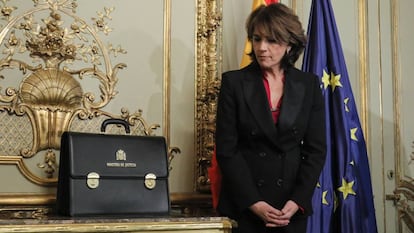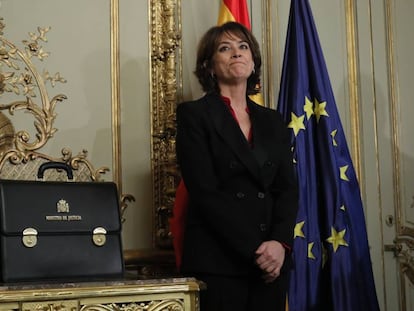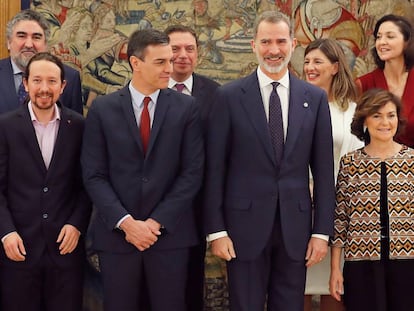A political error
The government must explain why it has chosen former justice minister Dolores Delgado to be prosecutor general

The new government of Pedro Sánchez has proposed appointing the outgoing justice minister, Dolores Delgado, as the new prosecutor general. Delgado will take over from María José Segarra, who was also appointed by the Sánchez government. Segarra’s time as the head of the public prosecution was defined by the trial against the Catalan separatists who, between September and October of 2017, attacked the Constitution and Catalan charter of rights, known as the Estatut, and declared the unilateral independence of Catalonia. The four public prosecutors, who were in charge of the case when Segarra was prosecutor general, argued that the separatists’ actions constituted the crime of rebellion, a position the Solicitor General’s Office disagreed with, and which was not upheld by the Supreme Court sentence.
It is paramount to know why the former justice minister was considered a better candidate than anyone else
There is no rule that stops a former member of the government from being named as prosecutor general. That is why Javier Moscoso, who had been a minister under former prime minister Felipe González of the Socialist Party (PSOE), was able to be named prosecutor general in 1986. There are fewer similarities with the appointment of Eligio Hernández, given that although he had been working for Spain’s legal watchdog, the CGPJ, his position was not as high-profile as a Cabinet minister. However, what separates the appointments of Javier Moscoso and Eligio Hernández from that of Dolores Delgado is the radical change in political circumstances in which they were made.
The fact that the success of Pedro Sánchez’s investiture bid depended on securing the abstention of the Catalan Republican Left (ERC) meant that the Socialist Party put the spotlight of the negotiation on an ambiguous document covering the territorial crisis in Catalonia, and an equally ambiguous idea of “dejudicializing” politics. The vagueness over how the relationship between the central government with the ERC and the Catalan regional government will develop has opened Delgado’s appointment to greater criticism. This has happened precisely because there has been no political explanation from the government, nor has the prime minister proven that the criticism is based on just opinions about their intent.
There is no rule that stops a former member of the government from being named as prosecutor general
The fact that the government proposes the appointment does not mean that the prosecutor general, once named, will take actions according to political opportunity, and not criteria rigorously outlined by the law. But just pointing out that the prosecutor general is named by the proposal of the executive, as Pedro Sánchez did in a radio interview, borders on political recklessness. It is paramount to know why the former justice minister was considered a better candidate than anyone else.
With his self-supporting explanation, Sánchez has given fuel to speculation about how Delgado will act in the future. The negative reaction of the political opposition, and most conservative public prosecution associations, threatens to make the work of the prosecutor general more difficult. And all at a time when the justice system urgently needs to recover both its composure and prestige.
English version by Melissa Kitson.
Tu suscripción se está usando en otro dispositivo
¿Quieres añadir otro usuario a tu suscripción?
Si continúas leyendo en este dispositivo, no se podrá leer en el otro.
FlechaTu suscripción se está usando en otro dispositivo y solo puedes acceder a EL PAÍS desde un dispositivo a la vez.
Si quieres compartir tu cuenta, cambia tu suscripción a la modalidad Premium, así podrás añadir otro usuario. Cada uno accederá con su propia cuenta de email, lo que os permitirá personalizar vuestra experiencia en EL PAÍS.
En el caso de no saber quién está usando tu cuenta, te recomendamos cambiar tu contraseña aquí.
Si decides continuar compartiendo tu cuenta, este mensaje se mostrará en tu dispositivo y en el de la otra persona que está usando tu cuenta de forma indefinida, afectando a tu experiencia de lectura. Puedes consultar aquí los términos y condiciones de la suscripción digital.










































